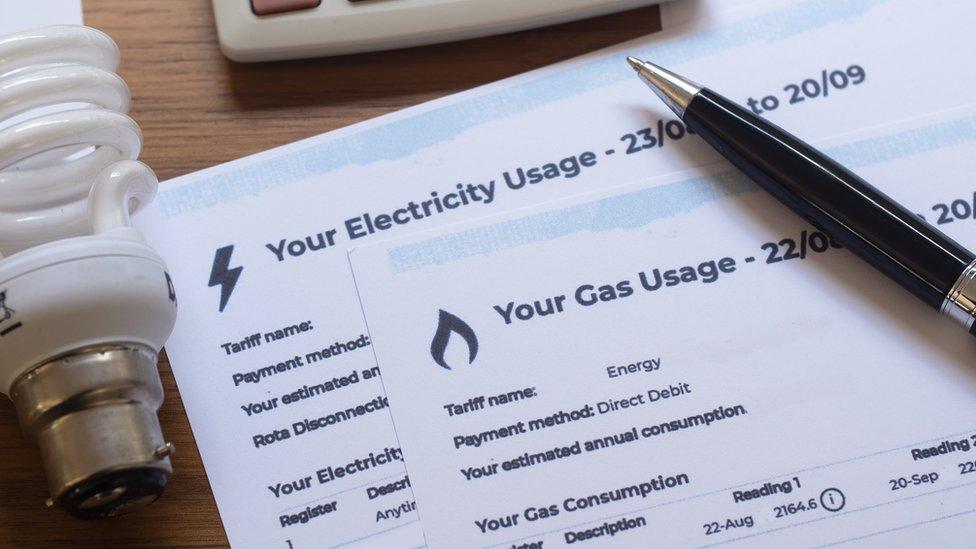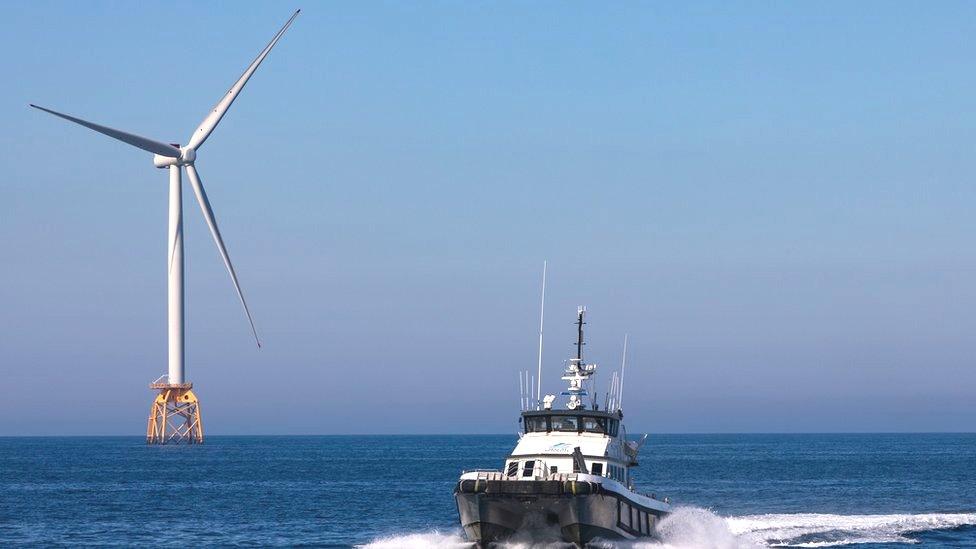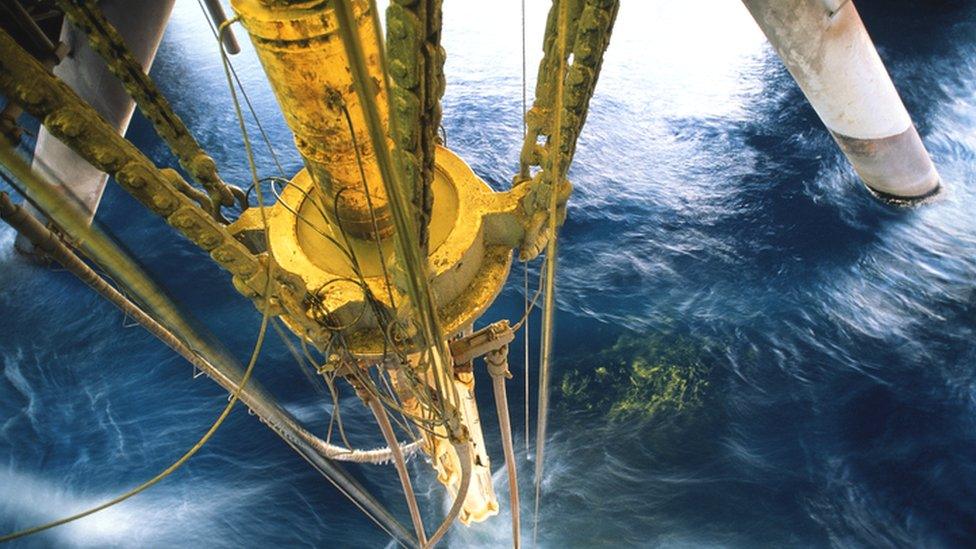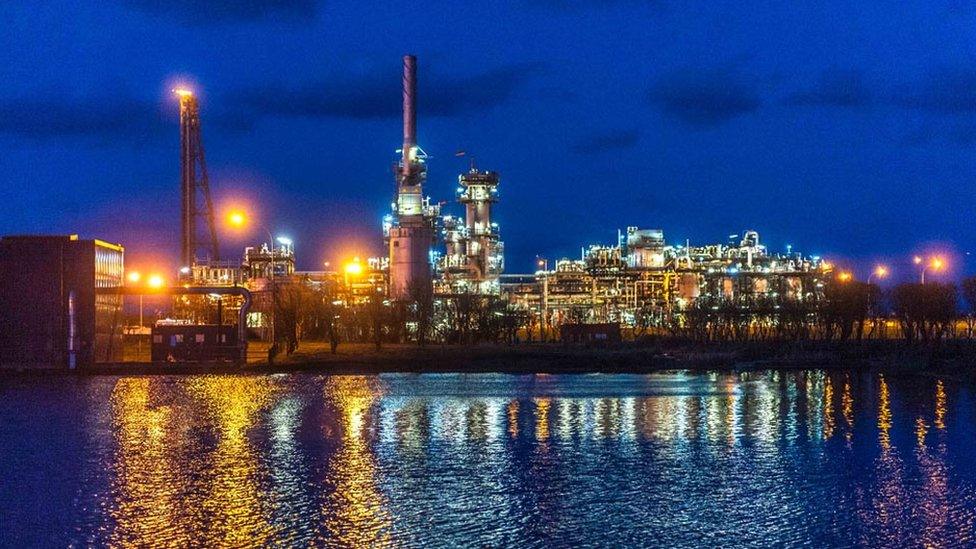Power switch: What Humza Yousaf means for energy
- Published

It's a big week for energy, as government payouts subside and the Westminster government aims to power up domestic supply.
At Holyrood, Humza Yousaf has big plans, both to take a stake in wind farms and to raise tax on energy giants.
The UK's oil and gas industry is warning both governments against acceleration of the decline in drilling while its costs rise steeply, measuring the price in jobs, energy security and import bills.
Hold on to your energy bills: It's shaping up to be quite a week.
It's not just that your £67 monthly government support payments stop on Thursday. That £400 winter payment was announced last May when Rishi Sunak was chancellor.
Or that the price cap per unit, announced last September when Liz Truss was prime minister, continues beyond its scheduled finish and on until June.
It's not only that support for business bills is sharply reduced from the start of April, causing some real concern as bills soar again.
It's also that Westminster is winding itself up for a Green Day this week. It is set to end the month and the winter support packages with some significant announcements.
The speculation is that the windfall tax - sorry, the Energy Profits Levy - may have a floor put under it. That would mean lowering it when prices fall below set levels for wholesale oil and for gas. The 75% tax on upstream production profit would be reduced, and possibly cut as far as the 40% level it was at a year ago.
The speculation is also that the 20-year £20bn energy transition spend announced in the Westminster Budget on 15 March will be deployed to accelerate carbon capture and storage (CCS) investments, including the Acorn Project. Based in north-east Scotland, that seeks to ally CCS with hydrogen production, throwing in some trials of sucking the carbon out of the atmosphere.
ScotWind licences
The vote for the new SNP leader and first minister also has a significant impact on the future of the country's energy sector.
Humza Yousaf's campaign policies included a plan to take a 10% equity stake in future rounds of allocating licences for offshore wind energy.
It is not clear if that involves finding the billions of risk capital pounds that would be required for just a tenth of the investment cost, or if this is some kind of advance tax through equity, requiring no investment in return for 10% of profit.
Either way, after the Scottish cabinet - with Mr Yousaf in it - signed off on the existing strategy without that equity stake, the new first minister has missed the boat on a very large part of Scotland's offshore green energy bonanza.

ScotWind licences to develop sea areas around Scotland on a staggering scale were awarded more than a year ago.
A second large tranche of permits were granted last week for Intog - innovation and targeted oil and gas.
That is for more than 5 gigawatts of floating offshore wind (enough to supply three million homes, when the wind blows), most of it to provide green power to offshore oil and gas installations, which use a lot of fossil fuels to pump fossil fuels. So it will be some years before this offshore wind equity can come into effect.
The new first minister may return to the tax issue before long, as his closing message in the leadership campaign was to boost redistribution of income to tackle child poverty and the cost-of-living crisis by yet more progressive tax from "higher earners, landowners and energy giants".
Green MSPs would surely applaud that, but less so Kate Forbes or John Swinney or some others who are wary about Scotland getting a reputation for its higher tax rates, with further divergence from Westminster from next week.
'Just transition'
Unlike his rivals and the party's Westminster leader, Humza Yousaf indicated continued support for Nicola Sturgeon's 'Just Transition' policy, away from oil and gas and towards greener alternatives (not including nuclear).
Others saw economic risk, as well as political danger in the north-east of Scotland, from accelerating the decline of offshore oil and gas.
The presumption against granting further licences for drilling and developing oil and gas fields in Scottish waters may not have much practical effect while those licences are controlled from Westminster.

A reminder of that was sent while the final votes were being cast in the SNP ballot on Monday morning.
The companies with rights to the undeveloped Talbot field, close to the central North Sea boundary between Scotland and Norway, were given permission by the UK government and its offshore energy authority to build a link to carry around 18 million barrels of hydrocarbons to the nearby Judy platform.
But the Offshore Energies UK (OEUK) trade body does not dismiss Bute House's significance. "It matters a lot, whether or not overall management of the industry is devolved," said a spokesman. "We've got a lot of critical issues to deal with.
"What we want to see from the new first minister is a reassessment of the importance of oil and gas from the point of view of energy security and also in terms of jobs."
It claims there are 215,000 jobs in the sector in the UK, on and off-shore. As a rough rule of thumb, half are in Scotland.
Tax plea
OEUK has turned itself into a full-on lobbying operation since the windfall tax was introduced last year. It is not trying to justify Shell's or BP's exceptional global profits, but to point to the risk of reduced investment and growing dependence on imported oil and gas.
Its business outlook document, published each year, is more often a matter-of-fact update on the state of the industry.
Its publication on Tuesday is much more than that. It reflects on an extraordinary year for markets, in which the average sterling price of crude oil rose more than 60%, and the benchmark price for gas was up 76% on 2021, and eight-fold on the preceding year.
It's also a lobbying plea for governments and Labour, if it is to be in government, to be less hostile to those drilling for oil and gas.
Between a high rating for political turbulence and risk, plus higher taxes, other cost increases including the interest rate on finance, along with supply chain and recruitment problems, 90% of member companies say the changed business environment will mean a hit to investment over the next five years.
Even before their profits can be taxed, the cost per barrel of developing a new field rose 20% last year. The costs once a field is in production have risen by 15% during the past year, and by 50% since 2019.
Untapped reserves
The report points to continued use of gas to heat Britain and oil to keep it moving for many years to come, particularly while governments have been slow to bring forward the plans and funds to replace gas boilers and insulate buildings better.
The risks from politics, tax, costs, supplies and recruitment have taken 250 million barrels of oil or its equivalent gas out of investment plans. The same amount again has moved from the probable to the merely possible - less than a 50% chance of going ahead.
For scale, those 500 million barrels happen also to be UK production for the whole of last year, supplying 44% of British gas demand and 67% of oil consumption. The remainder means imports and, it's implied, vulnerability to global markets.
With gas, domestic or imported, currently supplying 39% of Britain's energy mix (oil at 36%), some look to Liquified Natural Gas (LNG) imported from the USA or Qatar. The OEUK says supply of LNG is tight, demand from Asia could grow quickly and increase prices, and it has a higher carbon footprint than gas from the North Sea.
It is pointed out that the UK spent £117bn importing energy from overseas. Domestic production may not seem to count for much when oil and gas companies producing from UK waters sell their tankerloads on global markets where the price is highest.
Even in a crisis and political turmoil, there has been no indication the UK would use emergency powers to force UK producers to supply the UK market at prices below world prices. But using foreign currency to buy energy can be a drag on the UK economy.
The prospects for new drilling don't look good either. The number of new exploration wells is at its lowest level since 1970 and roughly quarter the rate at which fields are being closed down.
The fields currently being considered for further development, to get at untapped reserves, were discovered an average of 33 years ago. That indicates how technically difficult or marginal they were over those years.
Oil and gas remains an industry in decline - with or without higher tax, with or without the Scottish government's desire to keep hydrocarbons under the seabed.
The estimate is of 8% decline per year if there is a more positive environment to invest, or 15% per year if there is not. It would prefer to decline more slowly, and a more benign investment environment for building out wind turbines.
But oil and gas won't go without a fight.
- Published24 March 2023

- Published13 March 2023

